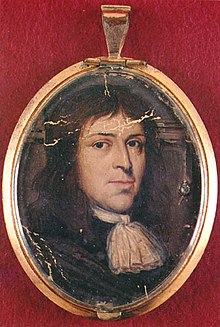Samuel Parris
| Samuel Parris | |
|---|---|

Portrait of Samuel Parris
|
|
| Born | 11 June 1653 London, England |
| Died | 27 February 1720 (aged 67) Sudbury, Massachusetts |
| Known for | Father and uncle of Salem witch trials accusers, accused along with his daughter and niece |
| Children | Thomas Parris Elizabeth Parris Susannah Parris |
Samuel Parris, son of Thomas Parris, was born in London, England to a family of modest financial success and religious nonconformity. Samuel emigrated to Boston in the early 1660s, where he attended Harvard University at his father's behest. When his father died in 1673, Samuel left Harvard to take up his inheritance in Barbados, where he maintained a sugar plantation.
In 1680, after a hurricane hit Barbados, damaging much of his property, Parris sold a little of his land and returned to Boston, where he brought Tituba and John and married Elizabeth Eldridge. Eldridge was noted by many as being incredibly beautiful, said to be one of the most beautiful women in Salem Village. Together they had three children, Thomas Parris, Elizabeth Parris, and Susannah Parris. Although the plantation supported his merchant ventures, Parris was dissatisfied with his lack of financial security and began to look to the ministry. In July 1689, he became minister of Salem Village (now Danvers), Massachusetts.
Salem Village was a contentious place to live and was known to be quarrelsome by neighbouring towns and villages. Its dispersed settlement pattern may have resulted in a lack of a sense of common purpose that may have united more orderly and arranged communities. Parris was the fourth minister appointed in a series of unsuccessful attempts to keep a permanent minister. James Bayley (1673–79) and George Burroughs (1680–83), each stayed only a few years, departing after the congregation failed to pay their full rates. Deodat Lawson (1684–88) left with less contention. Further tension was caused by Parris' delay in accepting the position and his inability to resolve his parishioners' disputes. There were disputes over Parris' compensation. In October 1691 the town decided to stop paying his wages. The issue was further antagonized by Parris' perceived arrogance when he purchased gold candlesticks for the meetinghouse and new vessels for the sacraments. These issues, and others that were more personal between the villagers, continued to grow unabated.
The events which led to the Salem witch trials began when Parris' daughter Betty and her cousin, Abigail Williams, accused Parris' slave Tituba of witchcraft. Parris beat Tituba until she confessed herself a witch, and John Indian, her husband, began accusing others. The delusion spread, many were apprehended, most of whom were imprisoned. During the 16-month duration of the Salem witch trials phenomenon, 19 persons were hanged, and one, Giles Corey, was pressed to death. As Parris had been an active prosecutor in the witchcraft cases, in 1693 his parish brought charges against Parris for his part in the trials. Parris apologized in his essay Meditions for Peace, which he presented in November 1694.Increase Mather led a church council which then vindicated him.
...
Wikipedia
